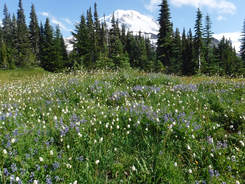Services
Click on one of the above links to explore the different services I offer.
You can also read more below about my specialty areas.
Starting therapy is understandably a step that can feel challenging or anxiety-provoking, and it
is important to be able to create a trusting relationship with a therapist.
If you are interested in setting up a phone consultation or first session, please contact me.
is important to be able to create a trusting relationship with a therapist.
If you are interested in setting up a phone consultation or first session, please contact me.
Areas of Focus and Expertise
- Working with LGBTQIA2S+ individuals and community
- Addressing impacts of oppression (e.g., sexism, racism, homophobia, transphobia, and ableism)
- Anxiety and depression
- Healing from sexual trauma and abuse
- Support with traumatic experiences and PTSD
- Relationship issues
- Identity exploration and coming out
- Life transitions and adjustment
- Grief and loss - personal and collective
- Ecotherapy and incorporation of relationship with nature
- Mindfulness and somatic awareness practices
- Stress management
Therapy Approach and Values
I strive to guide clients towards recognizing and unlocking patterns that may be impeding emotional growth, interpersonal relationships, the ability to experience authenticity and intimacy, or satisfaction in other areas of life. Along with learning more about yourself and the many factors that impact your well-being, therapy may also be a place for you to learn new skills to apply in your daily life and in your relationships with others. We will likely spend time noticing, focusing on, being curious about, and exploring your body sensations, emotions, and thoughts, as they arise throughout our time together in the therapy room.
I recognize and value an exploration of both the broader social and political context and our relationships with the natural world. I believe that our relationship with and connection to the natural world is a vital aspect of our well-being as individuals and communities. Although this does not have to be a therapeutic focus for the clients I work with, I find that one’s relationship with the natural world is often an important part of one’s identity and can be helpful to integrate into our therapeutic work together.
We are intwined with and impacted by the broader social and cultural structures around us, and in my work aim to continue finding ways for therapy to be one aspect of supporting and building collective liberation. I am committed to acknowledging and addressing the impacts of structural oppression (i.e., racism, sexism, homophobia, transphobia, ableism). In therapy I also support clients in recognizing and understanding the ways that white supremacy culture impacts our ways of being, and together working to unlearn and practice new ways of being with ourselves and each other. I am also interested in recognizing how group membership and community affiliation may also be source of connection and resiliency in your life.
One important aspect of therapy for many people is having a space to recognize and grieve different losses that may have occurred in your life, in your family's life, and that are ongoing collectively and culturally. Learning to reconnect with our and express our grief can help widen our capacity to be present in life and connect with the wider human and more-than human world.
I recognize and value an exploration of both the broader social and political context and our relationships with the natural world. I believe that our relationship with and connection to the natural world is a vital aspect of our well-being as individuals and communities. Although this does not have to be a therapeutic focus for the clients I work with, I find that one’s relationship with the natural world is often an important part of one’s identity and can be helpful to integrate into our therapeutic work together.
We are intwined with and impacted by the broader social and cultural structures around us, and in my work aim to continue finding ways for therapy to be one aspect of supporting and building collective liberation. I am committed to acknowledging and addressing the impacts of structural oppression (i.e., racism, sexism, homophobia, transphobia, ableism). In therapy I also support clients in recognizing and understanding the ways that white supremacy culture impacts our ways of being, and together working to unlearn and practice new ways of being with ourselves and each other. I am also interested in recognizing how group membership and community affiliation may also be source of connection and resiliency in your life.
One important aspect of therapy for many people is having a space to recognize and grieve different losses that may have occurred in your life, in your family's life, and that are ongoing collectively and culturally. Learning to reconnect with our and express our grief can help widen our capacity to be present in life and connect with the wider human and more-than human world.
Ecotherapy & Ecopsychology
|
What is Ecotherapy? The practice of ecotherapy comes out of a long human history of being rooted in and connected with the living world around us. The field of ecopsychology recognizes that we as humans have a connection with the natural world that is central to our mental well-being. There is a breadth of environmental and psychological research showing numerous mental and physical health benefits of spending time outdoors. This approach supports us in exploring our relationships to the more than human world, learning more about the land and histories of the places we live, and practicing relating to the place around us in new ways. What would this look like in therapy? For clients who are interested in incorporating this approach into their therapy, it will likely look different for each individual. For example, therapy sessions may include discussions about your relationship with nature, identifying strategies for enhancing your relationship with nature or your local community, exploring emotions about the current state of the world and environmental issues, or homework exercises that incorporate the natural world in them. There may also be an opportunity to meet for your sessions in an outdoor setting or nearby park. I encourage you to ask me if you have questions about this aspect of my practice or would like to know how it might be incorporated into our work together. “To be whole. To be complete. Wildness reminds us what it means to be human, what we are connected to rather than what we are separate from.”
- Terry Tempest Williams |
Why integrate psychology and ecology? Growing up in the Pacific Northwest, I have always felt deeply connected with the natural world. In college I studied psychology and environmental studies. I also came to learn more about the ways that we are impacted by how many of us currently live in modern, Westernized cultures. That is, by living quite disconnected from nature, we are often lacking an important relationship that is foundational to our existence and well-being as human beings. This culture-wide disconnection is one major source of the emptiness and loneliness that is so widespread in our current time. This disconnection also has roots in settler-colonialism, white supremacy, and capitalist systems, which also create unequal harm on people, communities, and the environment. In my own life and in my work with clients I have found that the natural world can be a source of solace, joy, and healing, when we allow ourselves to fully engage and connect with it. It may be a place where we can more readily access reverence for life, connection to a greater community, quietness inside or out, and even our more authentic selves. Depending on your early life experiences, cultural or familial background, where you live, social identities, and more — finding safety and comfort in the outdoors may not be familiar to you. I am interested in supporting all clients in this exploration and finding ways to more safely re-inhabit our bodies and our embodied connection to the earth. As a psychologist, I view it as my responsibility to hold a comprehensive perspective of mental health, and this means including the natural world in order to fully honor all of our environmental contexts and relationships. Author David Abrams has said that "Humans, like other animals, are shaped by the places they inhabit, both individually and collectively. Our bodily rhythms, our moods, cycles of creativity and stillness, even our thoughts are readily engaged and influenced by seasonal patterns in the land." Moving towards collective liberation includes attending to our relationships with the natural world and our surroundings, and learning more about the history and current issues of the place and community we live in. |



